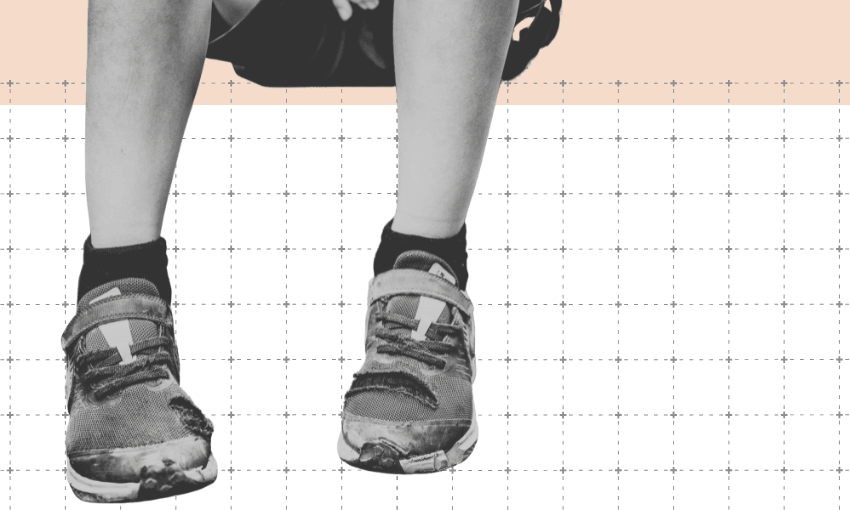The notoriously media-averse mayor was asked to appear on live radio and TV more than 20 times in the days after Auckland’s anniversary weekend floods. He accepted only twice.
Auckland mayor Wayne Brown rejected 20 requests for live radio or TV interviews in the immediate days after the anniversary weekend floods that claimed the lives of four people.
Figures released by Auckland Council to The Spinoff under the Local Government Official Information and Meetings Act show the mayor was invited to appear for an interview 22 times between January 27 – the night of the floods – and January 31.
He granted just two, both to RNZ. The first was a brief call ahead of the state of emergency being declared on January 27, during which Brown said “we really need [the rain] to stop”, while the second was a longer interview the following morning with Kim Hill.
During this interview, Brown largely defended his actions the night before, including what was perceived by many as a delay in declaring a state of emergency. Brown said he acted as quickly as he could, despite the state of emergency not being publicly confirmed until about 10pm – several hours after widespread flooding hit the city.
The mayor also appeared not to have full details of how the emergency response played out, including whether or not emergency text alerts were sent to households, and suggested other cities would be equally unprepared for a force majeure. “It’ll be interesting to see just how well-prepared Wellington is when the earthquake hits,” Brown said.
In the four days immediately after the floods, Brown also gave three press conferences, including one, described by 1News as “testy”, at which the mayor was observed being pulled away from the press by his deputy Desley Simpson.
The Spinoff also requested details of Brown’s media schedule across February, the month that included the arrival and immediate aftermath of Cyclone Gabrielle. The disaster, which largely pummelled the top half of the North Island, caused major damage in coastal parts of Auckland, including shutting off areas around Karekare and Piha.
Brown received 23 invites to appear on live radio and television across the entire month, accepting just four of these along with two one-on-one newspaper interviews. He held three further press conferences in February as well.
The mayor remained defensive of his actions on the night of the January floods, and the overall emergency response, until about a week after the disaster when he admitted he had “dropped the ball” in a video shared to his social media. A review was subsequently ordered, fronted by former police commissioner Mike Bush.
That was released last week, and criticised Brown and other council officials for a lack of visibility and empathy in the aftermath of the disaster. The 107-page report stated that a number of factors “aligned to create system failure” during the 12 hours of the initial emergency response. “Aucklanders did not receive the timely communications, leadership and practical support they had a right to expect in a crisis of this magnitude.”
“Key leaders” – including Brown – were denounced for a failure to “appreciate the vital importance of visible leadership and frequent public communication during a time of crisis”.
Somewhat ironically, the mayor was absent from the press conference at which the report was released to the media. He released a brief statement about it, in which he agreed to implement all the report’s recommendations, but chose to reject interview requests on the day.
Brown’s first interview following the report came on Saturday with Q+A’s Jack Tame. This was also the mayor’s first extended television interview since taking office last year. Brown defended his decision not to front the release of the flood review, telling Tame he had a prior engagement on the day the report was made public.
While Brown once again described the council’s flood response as “poor”, he refused to take full responsibility. “I was guilty, most of all, of assuming that they knew what they were doing,” he told Tame.
“We all could have done better, I apologised for dropping the ball. I didn’t realise a ball hadn’t been thrown to me….We were caught in the headlights. I wasn’t instructed, I received no information. You can’t see from my office what’s going on in Henderson or South Auckland.”
Brown added that, as mayor, he was in charge of only “a randomly selected group of councillors”, while the chief executive had additional responsibility.
Did Auckland mayor Wayne Brown show empathy for victims of Auckland's flooding? His response in full here https://t.co/roZt7uz9V5 pic.twitter.com/02TcnSJo9o
— Q+A (@NZQandA) April 16, 2023
The mayor’s choice not to front for regular interviews is, of course, his prerogative – particularly during times without major breaking news. Former prime minister Jacinda Ardern, for example, had an at times reluctant relationship with the media as well, at one point choosing to avoid interviews with Mike Hosking, the country’s highest profile radio broadcaster.
However, during times of crisis such as the Covid-19 pandemic, the prime minister was by far the most visible face of the initial government response. Brown on the other hand has left many of his media appearances in times of need to deputy Desley Simpson. She became the de facto political spokesperson for the council’s response to the flooding and subsequent preparation for Cyclone Gabrielle and was praised for filling the communications void.
Brown’s decision to avoid the media in the wake of January’s flood was not unexpected. In fact, media requests to speak with Brown across the first two months of the year were much lower than in the earliest few weeks of his tenure. RNZ reported in January that Brown was offered 108 interviews in his first month of office, accepting just two.
It appears decisions to accept or deny media invites are made ad hoc by the mayor. A request to council by The Spinoff for any “media policy” being followed by Brown was rejected as “this information does not exist”.





